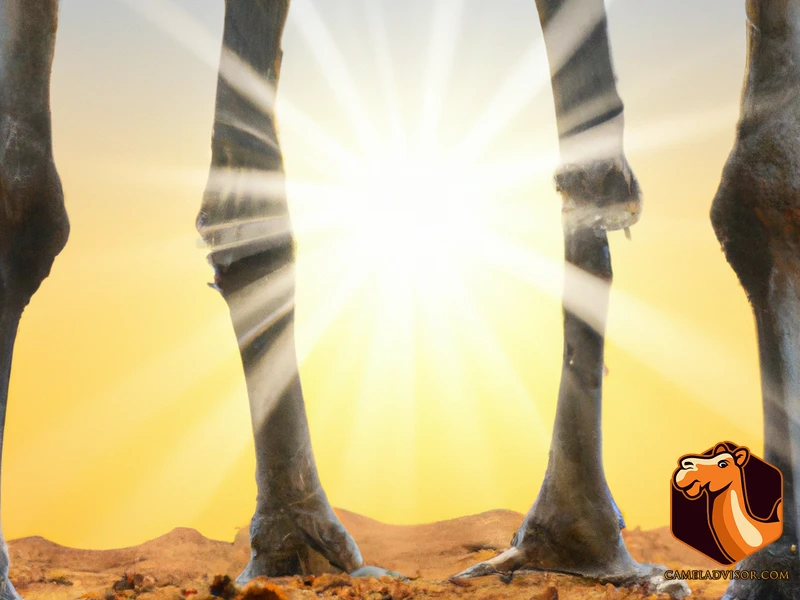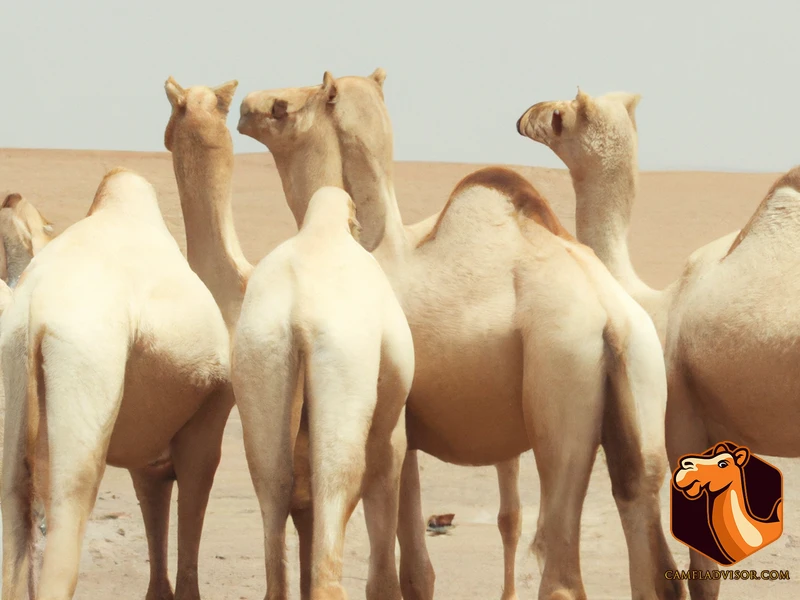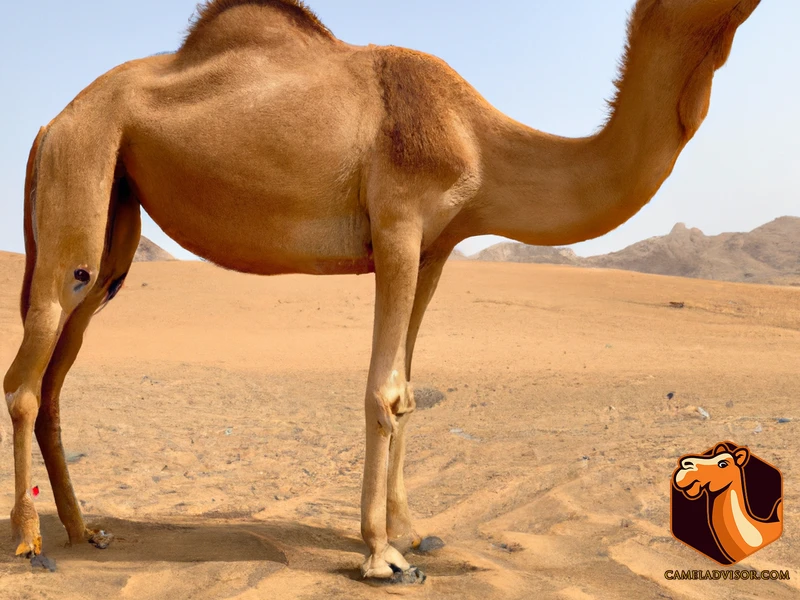As caretakers of magnificent creatures like camels, we are always eager to learn about their nutritional needs and health requirements. One of the most vital aspects of camel health is ensuring they have strong and healthy bones. The foundation of bone health is proper intake of essential minerals like calcium and phosphorus. But what are calcium and phosphorus, and why are they so important for camel bones? Let’s dive into the fascinating world of camel health and nutrition to find out.
Contents
What are Calcium and Phosphorus, and Why are They Important for Camel Bones?

Calcium and phosphorus are essential minerals that play a crucial role in maintaining the overall health and strength of the bones in camels. Calcium is the most abundant mineral in the body and is found primarily in bones and teeth, while phosphorus is the second most abundant mineral and is also present in bones and teeth, where it works together with calcium to maintain bone density.
Camels require adequate amounts of both minerals to support their skeletal structure and maintain strong and healthy bones. Proper calcium and phosphorus levels are crucial during growth and development, especially in young camels, as this is a critical stage for bone formation. Camels also require a balance of calcium and phosphorus during adulthood to maintain healthy bone density and prevent the risk of bone-related disorders.
Both minerals are involved in various metabolic processes in the body, and their deficiency can lead to several health problems, such as bone deformities, fractures, and weakness. Calcium and phosphorus also play a crucial role in the proper functioning of the nervous system, muscle contractions, and blood clotting.
It is important to ensure that camel’s diets provide appropriate quantities of calcium and phosphorus to maintain optimum health and prevent bone-related disorders.
To learn more about proper feeding practices for camels, check out our article on “Balanced Diet for Captive Camels”.
What are Calcium and Phosphorus?
Calcium and phosphorus are essential minerals that are important for various body functions, including building and strengthening bones in camels. Calcium is the most abundant mineral in the body and is necessary for muscle function, nerve transmission, blood clotting, and enzyme activity. Similarly, phosphorus is another essential mineral that plays a crucial role in bone formation, energy metabolism, and DNA synthesis.
Both calcium and phosphorus work together for the proper functioning of the body. Calcium provides the hardness and rigidity to bones, while phosphorus provides the structural framework. Inadequate intake of calcium and phosphorus can lead to weakened bones and skeletal disorders in camels.
Camels have specific calcium and phosphorus requirements, and lack of these minerals in their diet can result in severe health problems. It is essential to provide an appropriate amount of calcium and phosphorus to ensure that camels maintain healthy and strong bones.
To learn more about feeding camels a balanced diet, you can read our article on balanced diet for captive camels.
Why are Calcium and Phosphorus Important for Camel Bones?
Calcium and phosphorus are vital minerals for healthy camel bones. Calcium is the primary mineral that makes up the bone structure in camels. On the other hand, phosphorus is the second most abundant mineral in the camel’s body, and it works together with calcium to build and maintain strong bones. These two minerals must be consumed in appropriate amounts to ensure proper bone development, support, and maintenance.
Camels need calcium and phosphorus for various physiological processes to ensure their bones are strong enough to carry their weight and move across long distances. Camels are known for their ability to endure harsh environmental conditions, and their strong bones make this possible. They require these minerals not only during their early development stages but also throughout their life, especially when recovering from an injury or broken bone.
Calcium and phosphorus work in a delicate balance, and both minerals should be consumed in the correct ratio to ensure optimal absorption and utilization. A deficiency in calcium and phosphorus can lead to weak, brittle, and thin bones that are prone to fractures and damage. Camels that have inadequate mineral intake may develop skeletal abnormalities that will impede their ability to carry weight and move around effectively.
It’s important to note that other dietary factors can affect calcium and phosphorus absorption in camels. These include the presence of phytic acid, which is found in grains and legumes, as well as the overall balance of macronutrients, such as protein and fiber, in their diet. Additionally, inadequate water intake can exacerbate mineral deficiencies, as it can cause dehydration that leads to an imbalance in minerals in the camel’s body.
Adequate intake of calcium and phosphorus is crucial for healthy bone development and maintenance in camels. It’s essential to ensure that camels are consuming these minerals in the appropriate amounts, as well as considering other dietary factors that may influence their absorption. A balanced diet, proper feeding practices, and monitoring of mineral intake are keys to ensuring that camels stay healthy and mobile throughout their life.
Calcium and Phosphorus Requirements for Camels
Calcium and phosphorus are essential minerals for the growth and development of strong bones and teeth in camels. A lack of these minerals in a camel’s diet can cause skeletal problems such as bowed legs, fractures or soft bones. It’s crucial to understand the recommended daily intake of calcium and phosphorus and ensure that camels are receiving enough of these minerals.
Recommended Daily Intake for Camels:
Camels require a balanced ratio of calcium to phosphorus in their diet for optimal bone health. The recommended calcium to phosphorus ratio is between 2:1 and 6:1. Camels typically require around 20-30 grams of calcium and 15-30 grams of phosphorus per day, which may vary depending on their age, weight, and level of activity. Pregnant and lactating camels may need additional supplementation to meet their mineral requirements.
Sources of Calcium and Phosphorus for Camels:
Camels can obtain calcium and phosphorus from a variety of sources, including hay, grass, grains, and specially formulated camel feed. Alfalfa is an excellent source of calcium, while grains such as corn and oats provide phosphorus. Camel owners should ensure that their camel’s diet is properly balanced to meet their specific mineral requirements.
Factors Affecting Calcium and Phosphorus Absorption in Camels:
Camels’ ability to absorb calcium and phosphorus from their diet is affected by various factors. High levels of dietary fiber can inhibit mineral absorption, and overfeeding of salt can lead to reduced mineral uptake. Vitamin D is necessary for mineral absorption, and if a camel is deficient in this vitamin, it may impact their calcium and phosphorus levels. Proper feeding practices, such as avoiding overfeeding and balancing the ratio of minerals in a camel’s diet, can help maximize absorption.
It’s essential to ensure that camels receive adequate amounts of calcium and phosphorus in their diet to maintain optimal skeletal health. A balanced diet and proper feeding practices can help ensure that a camel’s mineral requirements are being met. It’s also important to monitor for signs of calcium and phosphorus deficiency and adjust the diet accordingly. Internal Link\ – For more information on proper feeding practices for working camels.
Recommended Daily Intake for Camels
Recommended Daily Intake for Camels
Camels require different amounts of calcium and phosphorus throughout their lifespan. For instance, a growing camel needs more calcium and phosphorus compared to an adult camel. A pregnant or lactating camel also has higher calcium and phosphorus requirements.
According to research, young growing camels need at least 15 grams of calcium per day and 10 grams of phosphorus per day, while lactating or pregnant camels may require up to 40 grams of calcium and 30 grams of phosphorus. In contrast, adult camels need around 10-20 grams of calcium and 12-15 grams of phosphorus per day, depending on average daily weight gain.
It is important to note that providing excess calcium and phosphorus to camels can also have negative effects. Over-supplementing with these minerals can lead to skeletal problems such as joint stiffness, arthritis, and even bone fractures. This is why it is important to carefully balance their diet according to their specific needs.
Factors such as the availability and quality of forage, geographical location, and management practices can affect the amount of dietary calcium and phosphorus that camels can absorb. To ensure that camels are receiving the appropriate amount of these minerals, their diet should be regularly reviewed and tested for nutrient content.
It is essential to consider other aspects of their diet, such as the levels of fiber, protein, and water intake. An imbalanced diet can affect the absorption of calcium and phosphorus, as well as other nutrients. For instance, feeding too much protein can result in an increased need for minerals like calcium and phosphorus, but excess protein can hinder their absorption.
To ensure that camels receive adequate amounts of calcium and phosphorus, it is essential to provide a balanced diet that meets their individual needs. This can be achieved through proper feeding practices, supplementing when necessary, and regular monitoring of their nutrient intake. Proper feeding practices are essential for the overall health and well-being of camels.
Sources of Calcium and Phosphorus for Camels
Calcium and phosphorus are essential minerals that are crucial for the development and maintenance of healthy camel bones. It is vital to ensure that camels receive adequate amounts of both of these minerals in their diet.
Sources of Calcium for Camels:
One of the primary sources of calcium for camels is hay, especially legume hay such as alfalfa, which is high in calcium. In addition to hay, camels can also obtain calcium from grains and commercial feeds, including those formulated specifically for camels. Some green vegetables such as kale and spinach also contain adequate amounts of calcium for camels.
Sources of Phosphorus for Camels:
Phosphorus is abundant in corn, oats, and barley – grains often found in commercial camel feeds. Camels can also get phosphorus from hay, especially grass hay, and alfalfa hay. Bone meal, which is made from crushed bones, is a good source of phosphorus and can be mixed with camel feed.
Calcium-to-Phosphorus Ratio:
Camels need both calcium and phosphorus in their diet, but it is also essential to maintain a suitable ratio between these minerals. The recommended calcium-to-phosphorus ratio for camels is 2:1. If the phosphorus intake exceeds the recommended levels, it can result in calcium absorption problems which ultimately limits bone development. An imbalance of calcium and phosphorus can also negatively impact the skeletal system and nervous system of camels.
Factors Affecting Mineral Absorption:
The absorption of calcium and phosphorus from food can be influenced by several factors, including age, diet, and animal health conditions. For example, young camels need more calcium and phosphorus than adult camels, and pregnant or lactating camels require additional amounts. Feeding camels excess salt can decrease calcium absorption.
Camels can obtain calcium and phosphorus from several dietary sources, including hay, grains, bone meal, and vegetables. Providing a balanced diet with the appropriate calcium-to-phosphorus ratio is vital in preventing deficiencies that can negatively impact the strength and health of camel bones. It is important to understand the factors that affect the absorption of minerals to ensure that camels are receiving the necessary nutrients from their diet.
Factors Affecting Calcium and Phosphorus Absorption in Camels
Calcium and phosphorus absorption in camels can be influenced by several factors. Firstly, the age of the camel is important, as younger camels require more calcium and phosphorus for growth and development. Pregnant and lactating camels also have higher requirements for these minerals. As a result, it is essential to ensure that these camels receive adequate amounts of calcium and phosphorus to support both their own health and the health of their young.
The ratio of calcium to phosphorus is also critical, as an imbalance can affect absorption. Ideally, the calcium to phosphorus ratio should be maintained at around 2:1 in the camel’s diet. However, excessive intake of one mineral can interfere with the absorption of the other, thereby affecting their overall utilization by the camel’s body.
The amount of dietary fiber can also affect calcium and phosphorus absorption. High levels of fiber in the diet can bind to minerals, making them unavailable for absorption. Conversely, low levels of fiber can lead to a rapid transit time of feed through the digestive tract, reducing the amount of time available for mineral absorption.
Other factors that can affect calcium and phosphorus absorption in camels include the quality of the water consumed, as well as the availability of other vitamins and minerals. For example, a deficiency in vitamin D can result in decreased absorption and utilization of calcium and phosphorus by the body. Similarly, an excess intake of salt can negatively affect mineral absorption by competing for the same transporters in the gut.
It is important to consider these factors when formulating a camel’s diet to ensure optimal absorption and utilization of calcium and phosphorus. Camels should also have access to clean, fresh water, and any potential vitamin deficiencies should be addressed. For more information on proper feeding practices for camels, see our article on proper feeding practices for working camels.
Signs of Calcium and Phosphorus Deficiency in Camels

Calcium and phosphorus play an essential role in the growth, development, and maintenance of strong bones in camels. A deficiency of calcium and phosphorus in a camel’s diet can lead to a range of health problems and affect their overall well-being.
One of the most common signs of calcium and phosphorus deficiency in camels is weak or brittle bones. Camels may experience bone fractures or develop bone deformities like kyphosis, which is an abnormal curvature of the spine. They may also have difficulty standing or walking, which can affect their ability to graze and obtain proper nutrition.
In addition to bone problems, camels with a calcium and phosphorus deficiency may exhibit other symptoms. These may include lethargy, weight loss, decreased appetite, and reduced milk production in lactating camels. In severe cases, calcium and phosphorus deficiency can lead to muscle tremors, seizures, and even death.
It is important to note that a calcium and phosphorus deficiency may not be the only cause of these symptoms. Other factors like overfeeding, a lack of fiber in the diet, or vitamin deficiencies can also affect a camel’s health and lead to similar symptoms. It is important to consult with a veterinarian if a camel is exhibiting signs of illness or malnutrition.
Ensuring that camels receive a balanced diet rich in calcium and phosphorus is key to preventing deficiency and maintaining their overall health. Additionally, providing free access to salt minerals can also help ensure proper mineral intake (learn more about the benefits and drawbacks of feeding camels salt here). Camels in pregnancy or lactation may also have higher calcium and phosphorus needs (read more about feeding camels in pregnancy and lactation here), and the amount of protein in their diet can also affect mineral absorption (read more about how much protein camels need here). Understanding the effects of overfeeding camels (read more here) and the importance of water intake in their diet (read more here) can also play a role in maintaining camels’ overall health.
How to Ensure Your Camels are Getting Enough Calcium and Phosphorus
To ensure that your camels are getting enough calcium and phosphorus, there are two main strategies you can employ: feeding a balanced diet and supplementing with these essential nutrients.
Feeding a Balanced Diet: The foundation of ensuring your camels are getting enough calcium and phosphorus is through feeding a balanced diet. This should include a variety of feed sources, such as hay, grasses, and legumes. It’s also important to ensure that the feed is fresh and high quality, as nutrient levels can decrease with age and storage. Camels require a high-fiber diet, so be sure to include sources of roughage such as hay or pasture. Their diet should also include a variety of vitamins and minerals to ensure overall health and wellbeing.
It’s important to note that excesses or deficiencies in other nutrients, such as Vitamin D or copper, can affect the absorption of calcium and phosphorus. For example, a deficiency in Vitamin D can lead to decreased calcium absorption and ultimately affect bone health. It’s essential to ensure a balanced and varied diet that takes into account all essential nutrients, not just calcium and phosphorus.
Supplementing with Calcium and Phosphorus: In some cases, feeding a balanced diet may not provide enough calcium and phosphorus for camels, particularly during certain stages of growth or reproduction. In such cases, supplements may be necessary to ensure proper intake of these essential nutrients. This can be done through a variety of methods, such as adding mineral blocks to their feed or administering oral supplements.
However, it’s important to be cautious when supplementing with calcium and phosphorus, as too much of either nutrient can be harmful. Excessive intake of calcium can lead to bladder stones and damage to the kidneys, while too much phosphorus can result in mineral imbalances and decreased absorption of other essential nutrients. It’s important to consult a veterinarian or animal nutritionist before adding supplements to your camel’s diet.
Ensuring that your camels are getting enough calcium and phosphorus is essential for their bone health and overall wellbeing. This can be achieved through feeding a balanced diet and, if necessary, supplementing with these essential nutrients. A proper diet that takes into account all essential nutrients such as vitamins and fiber can prevent problems liks a fiber-poor diet at the same time, and consulting experts is always the best way to ensure that your camels are receiving the proper nutrition.
Feeding a Balanced Diet
To ensure your camels are getting enough calcium and phosphorus, it is important to feed them a balanced diet. A camel’s diet should consist of high-quality forage such as a mixture of grasses and legumes, along with some concentrates such as grains or pellets. It is also important to provide clean water at all times.
In addition to forage and concentrates, camels may also benefit from supplements such as hay cubes or vitamin and mineral mixes. These supplements can help ensure that the camel is receiving enough calcium and phosphorus to maintain healthy bones.
It is important to note that a camel’s diet should be balanced in other ways as well. For example, camels require a high-fiber diet to maintain a healthy digestive system. A diet that is too high in protein or fat can lead to health problems such as obesity or vitamin deficiencies. To learn more about a high fiber diet for camels, you can read our article about fiber diet for camels.
It is also important to be aware of potential vitamin deficiencies in camels. Vitamins such as vitamin D and vitamin E are important for bone health, and deficiencies can lead to weakened bones and other health problems. To learn more about vitamin deficiencies in camels, you can read our article about vitamin deficiencies in camels.
By feeding a balanced diet and providing necessary supplements, you can ensure that your camels are receiving enough calcium and phosphorus to maintain healthy bones and avoid deficiencies.
Supplementing with Calcium and Phosphorus
Supplementing with calcium and phosphorus is a potential solution to ensure that camels receive their required amounts of these essential nutrients. There are various methods of supplementing camels with calcium and phosphorus, including feeding calcium and phosphorus-rich feedstuffs, administering oral drenches, and using mineral supplements.
Feeding calcium and phosphorus-rich feedstuffs is the most effective method of supplementing camels with these nutrients. Providing good-quality forage such as green alfalfa, clover, and grasses is a natural way to increase the supply of these minerals in a camel’s diet. In addition to forage, camel owners can feed other calcium and phosphorus-rich foods such as legumes and grains like oats and barley.
Oral drenches are an alternative method of supplementing camels with calcium and phosphorus. These are liquid solutions that contain the required amounts of these minerals and can be added to a camel’s drinking water or given directly into their mouth using a dosing gun. However, this method may not be a sustainable approach in the long term, as oral drenches can be difficult to administer and camels may refuse to drink the water that contains the solution.
Mineral supplements are another option for providing additional calcium and phosphorus to camels. These supplements come in the form of blocks or powders, and can be placed in feeders or scattered in the feeding area. Mineral supplements offer a convenient way to ensure that camels receive the required amounts of these minerals on a daily basis. However, it is important to select a supplement that is specifically formulated for camels as their nutrient requirements may differ from those of other livestock animals.
Supplementing with calcium and phosphorus can be a practical and effective solution for ensuring that camels receive the required amounts of these essential minerals. However, it is important to consult with a veterinarian or animal nutritionist before administering supplements to camels as over-supplementation can lead to health problems. Additionally, supplementing should not be used as a substitute for providing a balanced diet as natural feedstuffs are the best source of nutrients for camels.
Conclusion
In conclusion, ensuring that camels receive adequate amounts of calcium and phosphorus is crucial for maintaining healthy bones. These minerals play a critical role in many bodily functions, including muscle and nerve function, blood clotting, and the formation and maintenance of bones and teeth.
Feeding a balanced diet is the best way to ensure that camels receive adequate amounts of calcium and phosphorus. This includes providing them with a variety of foods that are naturally rich in these minerals, such as alfalfa hay, grains, and legumes. Additionally, it is important to maintain balanced calcium to phosphorus ratios in the overall diet, as an excess of one mineral may interfere with the absorption of the other.
Supplementing with calcium and phosphorus may also become necessary in some circumstances, such as when camels are not consuming enough calcium and phosphorus through their diet or when they have specific health conditions that increase their need for these minerals. However, it is important to consult with a veterinarian to determine the appropriate dosage and form of supplementation and to ensure that it is not interfering with any other medications or supplements the camel may be taking.
Signs of calcium and phosphorus deficiency can be subtle, but may include bowed legs, a lack of appetite, and decreased growth or productivity. Therefore, it is important to monitor camel health and behavior closely and adjust their diet or supplementation as needed.
Overall, by understanding the role of these minerals in camel health and taking steps to ensure they receive adequate amounts through a balanced diet and potential supplementation, owners and caretakers can help prevent the development of health issues related to calcium and phosphorus deficiencies.
Frequently Asked Questions
Question 1?
What are the daily calcium requirements for adult camels?
Answer:
Adult camels require between 0.3-0.5% calcium in their daily diet.
Question 2?
What are the major sources of calcium in a camel’s diet?
Answer:
The major sources of calcium in a camel’s diet include green fodder, alfalfa hay, and calcium supplements.
Question 3?
How much phosphorus does a camel need in its diet?
Answer:
Camels require 0.2-0.3% phosphorus in their diet.
Question 4?
What are the common signs of calcium and phosphorus deficiency in camels?
Answer:
Common signs of calcium and phosphorus deficiency in camels include lameness, stiffness, weakness, and the development of bone deformities.
Question 5?
Are there any factors that can affect calcium and phosphorus absorption in camels?
Answer:
Yes, factors such as age, diet, and mineral imbalances can affect the absorption of calcium and phosphorus in camels.
Question 6?
Can too much calcium and phosphorus in a camel’s diet be harmful?
Answer:
Yes, excessive intake of calcium and phosphorus can lead to mineral imbalances, which can have negative health effects on camels.
Question 7?
How can camel owners ensure their animals are getting enough calcium and phosphorus in their diet?
Answer:
Camel owners can ensure their animals are getting enough calcium and phosphorus by feeding a balanced diet consisting of quality forage and supplements, if necessary. They can also have their animal’s blood mineral levels tested regularly to monitor for deficiencies.
Question 8?
What are some good sources of phosphorus for camels?
Answer:
Good sources of phosphorus for camels include concentrates, such as corn and soybean meal, and green fodder.
Question 9?
Can calcium and phosphorus supplements be given together?
Answer:
Yes, calcium and phosphorus supplements can be given together, and are often combined into a single supplement.
Question 10?
Is it possible to over-supplement with calcium and phosphorus?
Answer:
Yes, it is possible to over-supplement with calcium and phosphorus, leading to mineral imbalances and negative health effects on camels. It is important to follow recommended dosage guidelines and have blood mineral levels monitored regularly.







